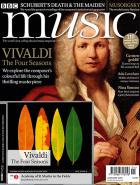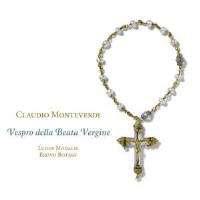Texte paru dans: / Appeared in: |
|
|
Appréciation d'ensemble / Overall evaluation :
|
|
|
Bruno Boterf brings us a Vespers of unique beauty, in a version Claudio Monteverdi had printed but which until now has never been recorded. Published in 1610, the Vespers won the composer the coveted directorship of St Mark’s, Venice. It’s easy to see why: in scope, scoring, invention and technical command, the work dwarfs any earlier music of its kind. But in his one edition Monteverdi actually gave the means to create two productions, one sumptuous and an other smaller-scale.
Until Boterf, all directors took up the former, with its 15-instrument ritornelli ‘Sonata sopra Santa Maria’ and its seven-voice Magnificat. The smaller Vespers that Boterf performs has no ritornelli, no ‘Santa Maria’ sonata, and a six-voice Magnificat. The brash introduction from Orfeo is gone, as are the super-sized vocal forces often deployed for this work, reduced here to just 12 singers occasionally doubled by one instrument. But Boterf’s stripped-back Vespers offers a more sumptuous array of colours and vocal artistry than many standard recordings.
The Vespers, large or small, is every thing early 17th-century Marian worship could be: plain song, polyphony, ad libitum embellishment and concerted voicing with continuo. The melodic boldness that binds this material is the focus of Ludus Modalis, Boterf’s vocal ensemble. Their plain song is as urgent as if it were recitative, and when extemporising, each soloist stretches material to its limits; tenor Vincent Bouchot’s fire works in ‘Nigra sum’ in particular have no equal.
The ensemble also brings out passages that the six-voice Magnificat shares with the seven-voice version, showing a firm grasp of both. Boterf gilds Monteverdi’s polyphony by using two trebles in another wise one-to-a-part ensemble. This delicate imbalance yields an astonishing range of affect: how could the same ensemble be so coldly imperious (as in ‘Nisi Dominus’) and then so warmly tender (as in ‘Ave Maris stella’)? Boterf heightens these contrasts by adding chant and instruments. As printed, the Vespers is not a service, but Boterf has us imagine one, framing Monteverdi’s psalm settings with antiphons of his choosing. With polyphony thus book ended by chant, the splendour of multi-voice singing strikes us anew. Boterf juxtaposes timbres as well as textures, deploying wonderfully weird in struments such as a bass cornett, a bass sack but and a brass-strung harpsichord along side a gut strung harpsichord. He matches these instruments to voices unpredictably, some times blending similar timbres (bass to sack but) to fatten sections, some times pitting unlikely timbres against each other to isolate a part. The result trans forms Monteverdi’s falsobordone, continuo and single lines.
The organ, constructed after a Costanzo Antegnati original, reigns over this
collective: its mean-tone temperament prevails, and two movements from
Frescobaldi’s Fiori Musicali (1735), brilliantly executed by Anne Marie Blondel,
replace the absent ‘Sonata sopra Sancta Maria’. This addition is the icing on a
gorgeous sonic cake.
| |
|
|
|
|
|
|
|
Cliquez l'un ou l'autre
bouton pour découvrir bien d'autres critiques de CD |
|




